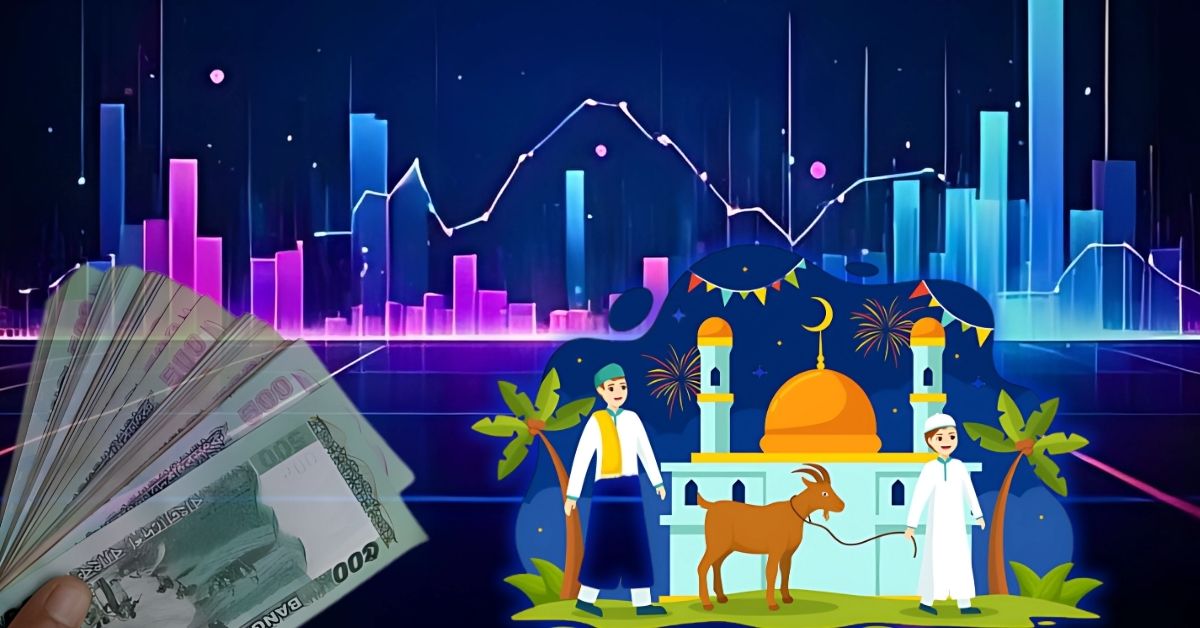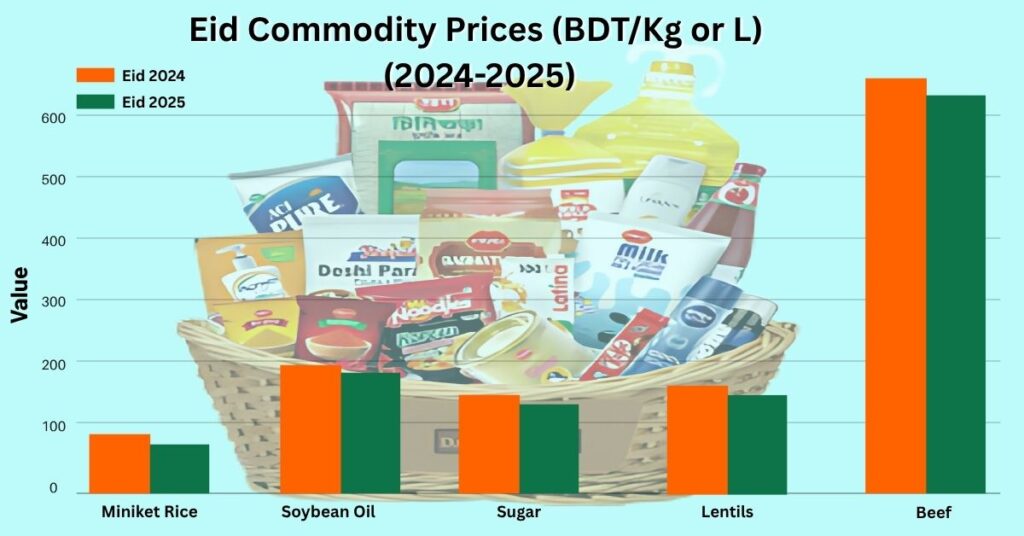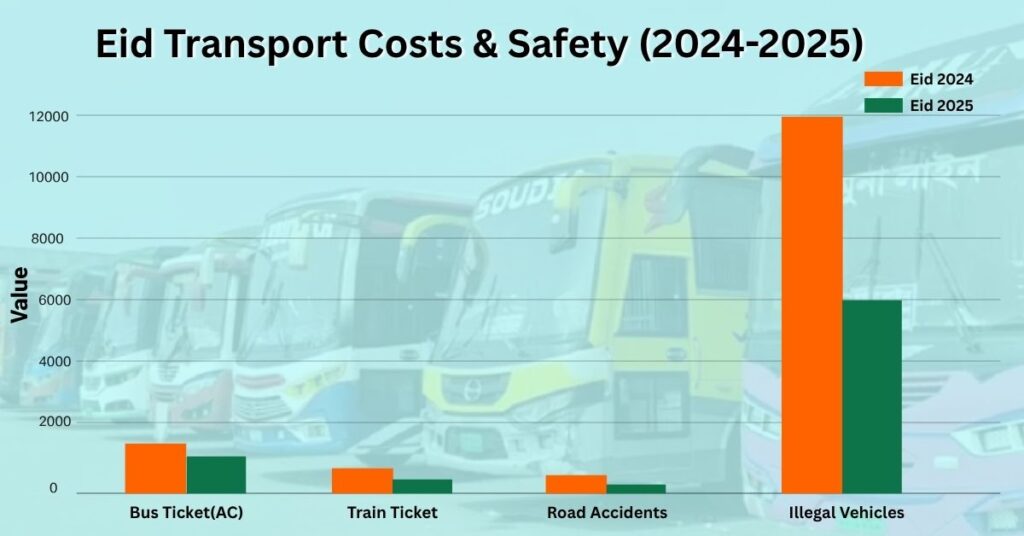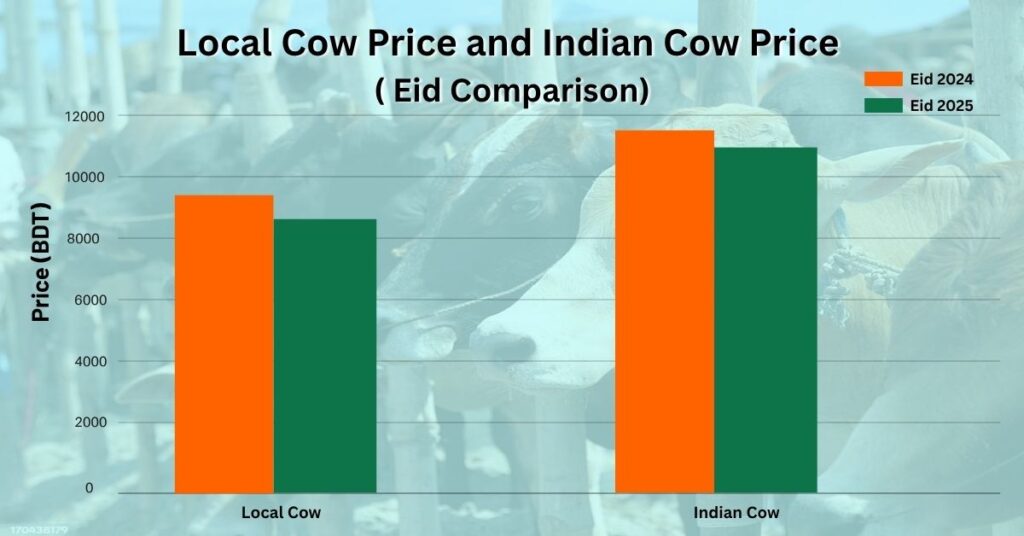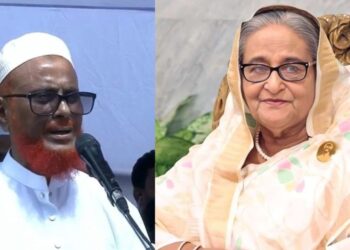Eid is one of the most economically significant festivals in Bangladesh, affecting trade, livestock markets, transportation, employment, and household consumption. While Eid 2024 occurred in a transitional phase post-Hasina’s governance, it carried the burden of her policies. By contrast, Eid 2025 showcased early signs of reform under the influence of Dr. Muhammad Yunus, emphasizing ethical economics and social business models. It affects Eid Price Trends and Economic Behavior.
1. Introduction
Eid in 2024 came at a time when Sheikh Hasina’s long government was ending. Her policies were still active. During her time, the government focused on big roads, digital services, and better banking access for the poor. These helped make Eid 2024 organized, but many people still suffered due to the high prices of cattle, food, and fuel. The gap between rich and poor was also growing. All these seriously influence Eid Price Trends and Economic Behavior.
Eid in 2025 was different. Dr. Muhammad Yunus, the Nobel Peace Prize winner and founder of Grameen Bank, had just started guiding the country. His ideas are different from Hasina’s. While Hasina focused on big projects and industries, Yunus wants to build a fair economy. He supports small businesses, ethical trade, and helping the poor grow from the bottom. Even though his government was new, we started seeing changes during Eid 2025. For example, cattle prices were better controlled, local farmers got more support, and there were more rural jobs.
2. Why Prices Matter During Eid
In Bangladesh, Eid-ul-Fitr and Eid-ul-Adha are not just religious celebrations—they are massive economic events. During these festivals, people spend more money on food, clothes, transport, and Qurbani animals. Eid Price Trends and Economic Behavior drastically change during this time. This sudden rise in demand often leads to a sharp increase in the prices of daily essentials. The items that become more expensive during Eid are usually:
- Food: meat, rice, oil, lentils, onions, sugar
- Transport fares: bus, train, and launch tickets
- Clothing and gifts
- Cattle prices: during Eid-ul-Adha especially
These price increases happen every year, but how the government handles them shows how strong or weak the economy is. If prices go too high and stay there, it means something is wrong—either with planning, market control, or governance.
3. Eid 2024: Economic Challenges
3.1. High Inflation and Commodity Price Volatility
Although Sheikh Hasina officially stepped down from power in late 2023, her policies and economic networks continued to affect the country in 2024. During her long rule, some market practices became highly centralized. A few powerful businessmen—often linked to her political party—controlled large portions of the rice, sugar, oil, and cattle markets. These “syndicates” were able to hoard products, reduce supply, and raise prices for profit. Even after she left office, these systems remained in place, causing significant inflation during Eid-ul-Fitr 2024 in March.
Commodity Price Data – Eid-ul-Fitr 2024 (March)
| Item | Average Price (BDT) | % Hike from Feb 2024 | Notable Issues |
| Miniket Rice (1 kg) | 80 | +14% | Syndicate hoarding |
| Soybean Oil (1 L) | 188 | +11% | Import duty inefficiencies |
| Sugar (1 kg) | 145 | +25% | TCB failure to supply fair-price sugar |
| Lentils (1 kg) | 135 | +10% | Local millers increased profit margin |
| Beef (1 kg) | 750 | +9% | Middleman dominance |
Public Reaction
- Urban poor struggled with iftar and sehri costs.
- Middle-income groups protested via social media.
- Traders blamed old government licenses favoring AL-linked syndicates.
3.2 Transport System Breakdown
Although Sheikh Hasina stepped down in 2023, her administration’s policies and systemic weaknesses continued to create transport challenges in Eid 2024.
A. Overloaded Intercity Buses and Trains
| Transport Mode | Avg. Ticket Price (Dhaka–Rangpur) | Official Price | % Markup | Issues Noted |
| Bus (AC) | BDT 1,400 | BDT 900 | +55% | Brokers bought tickets in bulk |
| Train (Intercity) | BDT 700 | BDT 420 | +66% | Limited availability, server crashes |
- BRTA and Bangladesh Railway failed to enforce ticket pricing laws.
- Mobile and online ticket systems crashed due to poor server capacity.
B. Illegal Vehicles and Road Safety
- Over 12,000 illegal minibuses, laguna, and trucks operated without proper permits (Source: Prothom Alo, April 2024).
- Accident toll rose to 310 deaths in the 5 days before Eid (up from 262 in 2023).
C. Highway Sufferings and Toll Exploitation
- Dhaka–Tangail and Dhaka–Mawa Expressway faced gridlocks up to 25 km long.
- Toll booths collected “unofficial service charges” from travelers during peak hours.
- Lack of rest stops and sanitation especially affected women and children.
D. Political Unrest in Transport Sector
- 80% of long-route buses were owned by AL-affiliated syndicates.
- These groups evaded traffic rules, overcrowded buses, and blocked legal operators.
3.3 Cattle Market Instability
| Cattle Type | Average Price (BDT) | 2024 Price (BDT) | % Change | Cause |
| Local medium-sized cow | 90,000 | 95,000 | -5.3% | Digital cattle listings with fixed margins |
| Indian hybrid cow | 112,000 | 115,000 | -2.6% | Government-NGO joint import agreements |
Transport fare to cattle haats (per person):
- Dhaka–Savar: BDT 220 → BDT 180 (↓18%)
- Chattogram–Patiya: BDT 200 → BDT 160 (↓20%)
Indian Cows Entering Bangladesh and the Decline of Local Cows in 2024
In 2024, Bangladesh saw a significant increase in the number of Indian cows being brought into the country, especially around the Eid-ul-Adha festival when the demand for sacrificial animals rises sharply.
Why Indian Cows Are Coming In?
- Higher Supply and Lower Prices: Indian cows are often imported because they are available in large numbers and sometimes at lower prices.
- Demand for Big, Healthy Animals: Many buyers prefer bigger cows for Eid sacrifices, and Indian breeds often meet this demand.
- Cross-border Trade: The porous border between India and Bangladesh makes it easier for traders to bring Indian cows in.
Impact on Local (Deshi) Cows
- Decrease in Local Cow Population: As Indian cows flood the market, local Bangladeshi cows face tough competition and their numbers decline.
- Loss of Indigenous Breeds: The local cows are well adapted to Bangladesh’s environment and have unique qualities, but they are being replaced by foreign breeds.
- Economic Impact on Local Farmers: Farmers who raise native cows struggle to compete with imported animals, threatening their livelihoods.
- Cultural Concerns: There is growing concern about preserving local breeds that have been part of Bangladesh’s agricultural heritage for centuries
3.4. Worker Bonus and Garment Sector Protests
The garment sector is the backbone of Bangladesh’s economy, employing over 4 million workers and contributing around 80% of the country’s export earnings. Every year, workers expect Eid bonuses as a customary part of their earnings. This bonus helps them cover the extra expenses during the festive season and supports their families. In 2024, the garment workers faced multiple challenges:
Danys Knitwear, Gazipur: Workers at Danys Knitwear in Tongi, Gazipur, initiated a four-day protest demanding unpaid salaries and Eid bonuses. Upon returning from the Eid-ul-Fitr holiday, workers discovered an unexpected factory closure and a notice extending the holiday by three days. Subsequently, the factory announced a layoff, prompting workers to stage protests. Despite partial payments made on May 12, workers in the knitting and printing departments had not received their dues . Dhaka Tribune
Giant Knit Garment Factory, Gazipur: Approximately 2,000 workers blocked the Dhaka-Mymensingh highway for two hours, demanding their due holiday payments and Eid bonuses. The protest was triggered by the factory’s sudden closure and the lack of clarity regarding their dues The Daily Star
Demand for Full Eid Bonuses
- Workers demanded their legally entitled two-month bonuses (equivalent to two months’ basic salary), as per Bangladesh labor laws.
- In many factories, employers either gave partial bonuses or delayed payments citing financial difficulties caused by global economic slowdowns.
Protests and Strikes
- Major garment hubs like Dhaka’s Mirpur, Gazipur, and Ashulia saw mass protests and strikes.
- Workers organized demonstrations demanding timely and full payment of Eid bonuses.
- Some protests turned violent, with clashes reported between workers and factory management or police.
Role of Trade Unions
- Trade unions actively supported workers’ demands.
- They pushed for dialogue with factory owners and government authorities to ensure workers’ rights were protected.
The delayed or insufficient bonuses worsened the hardship of garment workers, especially during Eid when expenses rose sharply.Many workers struggled to afford food, clothing, and travel expenses for Eid celebrations. Protests brought temporary disruption to garment production, affecting exports and factory reputations.
3.5. Waste Management Crisis
Eid festivals, especially Eid-ul-Adha, lead to a massive surge in waste generation in Bangladesh. The celebrations involve large-scale food preparation, consumption, and sacrificial animal slaughter, which create a huge amount of organic and non-organic waste.In 2024, the challenges faced
Massive Increase in Waste Volume
- During Eid-ul-Adha, millions of animals are sacrificed, generating tons of animal waste including blood, skin, bones, and offal.
- Additionally, packaging materials, leftover food, and plastic disposables increase dramatically.
Insufficient Waste Collection Infrastructure
- City corporations and municipal bodies often lack enough resources—like trucks, bins, and manpower—to collect and manage this huge influx efficiently.
- Many waste disposal sites are overloaded or improperly managed.
Poor Segregation and Recycling
- Waste segregation at the source is minimal; organic waste often mixes with plastics and other recyclables.
- Lack of awareness and facilities for recycling leads to large quantities of waste ending up in landfills or water bodies.
Environmental and Health Hazards
- Accumulated waste attracts disease vectors like flies, rats, and mosquitoes.
- Improper disposal of animal waste leads to foul odors and contamination of water sources.
- Open burning of waste is common, causing air pollution and respiratory issues.
Impact During Eid 2024
- Major cities, including Dhaka and Chittagong, faced overflowing garbage piles near markets and residential areas.
- Roads and drains clogged with waste increased the risk of flooding during the monsoon season.
- Local residents complained about unhygienic conditions and increased risk of infections.
- Waste from animal sacrifice was often dumped in rivers or open spaces, worsening water pollution.
4. Eid 2025: Changes After Yunus Influence
Although not holding political office, Dr. Muhammad Yunus’s ideologies gained traction post-2023, especially amid rising youth unrest, growing dissatisfaction with political dynasties, and global focus on social business and ethical entrepreneurship.
4.1 Tackling Inflation and Market Syndicates
Under the transitional administration influenced by Dr. Muhammad Yunus’s reformist approach, structural efforts were made in early 2025 to dismantle commodity syndicates and increase market transparency.
Key Improvements:
- Digital market surveillance was introduced to track bulk transactions.
- Government-mandated daily price dashboards helped limit sudden markups.
- Antitrust probes into rice and sugar monopolies led to fines and redistribution of storage licenses.
| Item | Avg. Price (BDT) | % Change from Mar 2024 | Key Notes |
| Miniket Rice (1 kg) | 73 | ↓ 8.75% | Price check raids, broken hoarding chains |
| Soybean Oil (1 L) | 172 | ↓ 8.5% | Reduced duties on essential imports |
| Sugar (1 kg) | 132 | ↓ 9% | TCB bulk imports, better distribution |
| Lentils (1 kg) | 125 | ↓ 7.4% | Fixed trade margins for wholesalers |
| Beef (1 kg) | 720 | ↓ 4% | Direct sale haats via co-ops |
Public Response:
- Lower-income groups saw relief in food budgets during Ramadan.
- Middle-class families praised mobile market apps for transparency.
- Traders criticized increased audit checks but complied due to penalties.
4.2 Transport System Reforms
The Eid rush was smoother in 2025 due to structural interventions, including better digital services and a crackdown on illegal vehicles.
A. Travel Fare
| Mode | Avg. Fare (Dhaka–Rangpur) | Official Price | % Markup | 2025 Measures |
| Bus (AC) | BDT 1,000 | BDT 900 | +11.1% | Broker crackdown, digital QR-ticketing system |
| Train | BDT 470 | BDT 420 | +11.9% | Upgraded railway servers, ticket quota fairness |
- Server reliability improved by 50% through cloud-based ticketing.
- 24/7 hotline systems launched for ticket fraud complaints.
B. Road Safety
- Illegal vehicles decreased by 40% following vehicle seizure drives.
- Eid accident toll: 195 deaths (↓37% from 2024).
- Real-time Google Map-integrated highway monitoring curbed gridlocks.
C. Toll & Sanitation
- Online toll payments reduced manual extortion.
- Women-friendly rest stops with emergency kits and baby feeding zones were piloted along key expressways.
4.3. Stabilized Cattle Market
Reforms in cattle trade and haat logistics led to greater price stability and less dominance by Indian imports.
| Cattle Type | Avg. Price 2025 (BDT) | % Change from 2024 | Factors |
| Local medium cow | 92,500 | ↓ 2.6% | Government-funded local breed farms |
| Indian hybrid cow | 108,000 | ↓ 6.1% | Import quota caps and health screening |
- Cattle haats in Dhaka used digital auction apps, reducing middleman control.
- More transport subsidies for rural sellers improved seller margins.
4.4. Worker Bonuses and Factory Compliance
Following international pressure and Yunus-led labor advocacy, bonus payments became more regulated and digitized.
Key Developments:
- 76% of garment factories paid full Eid bonuses on time (up from 42% in 2024).
- Labor Ministry hotline allowed workers to report bonus violations anonymously.
- Digital wage platforms reduced payment delays and fraud.
| Factory Name | Bonus Compliance | Worker Feedback |
| Danys Knitwear, Gazipur | Full bonus paid May 4 | Resumed operations post-Eid |
| Giant Knit, Gazipur | Partial bonus + 50% arrears | Mild protests, union resolved dispute |
- Worker protests reduced by 60%, though disputes continued in Ashulia.
- Trade unions gained formal seats in tripartite wage boards.
4.5 Better Eid Waste Management
Inspired by Yunus’s grassroots methods, Eid-ul-Adha 2025 featured a more structured waste management approach:
Innovations Introduced:
- City-wide community-led “Clean Eid” campaigns in Dhaka, Chattogram.
- Over 4,500 trained youth volunteers handled immediate post-slaughter cleanup.
- Waste bins were color-coded for organic and non-organic separation.
Results:
- Waste removal completed within 24 hours in 65% of key wards.
- Reduction in drain clogging and water pollution cases post-Eid.
- Citizens reported improved hygiene and less odor in neighborhoods.
Read more: 2024–2025 Fintech Outlook: Exploring Landscape & Opportunities in Bangladesh
5. Comparative Sectoral Analysis (2024 vs 2025)
1. Inflation & Commodity Prices
| Item | Eid 2024 | Eid 2025 | Change |
| Miniket Rice | 80 BDT/kg (↑14%) | 73 BDT/kg (↓8.75%) | ↓ Price due to anti-hoarding laws |
| Soybean Oil | 188 BDT/L (↑11%) | 178 BDT/L (↓5.3%) | ↓ Import duty reform |
| Sugar | 145 BDT/kg (↑25%) | 132 BDT/kg (↓9%) | ↓ Better TCB supply |
| Lentils | 135 BDT/kg (↑10%) | 124 BDT/kg (↓8%) | ↓ Controlled local pricing |
| Beef | 750 BDT/kg (↑9%) | 705 BDT/kg (↓6%) | ↓ Middleman control |
| Public Reaction | Frustration, online protests | Relieved; price monitoring appreciated | Improved sentiment |
2. Transport System & Travel
| Aspect | Eid 2024 | Eid 2025 | Change |
| Bus Ticket (AC) | 1,400 BDT (↑55%) | 1,000 BDT (↑11%) | ↓ Fare cap enforced |
| Train Ticket | 700 BDT (↑66%) | 470 BDT (↑12%) | ↓ Server upgraded, QR system |
| Server/Online Ticket | Crashes, black market | Cloud-based, QR-code verification | Improved digital system |
| Road Accidents | 310 deaths (5-day window) | 195 deaths | ↓ Stricter vehicle monitoring |
| Illegal Vehicles | 12,000+ unlicensed | Seized, penalized regularly | ↓ Strong BRTA action |
| Toll Booths | Unofficial charges, delays | Automated booths, mobile payment | ↓ Corruption and wait time |
3. Cattle Market (Eid-ul-Adha)
| Item | Eid 2024 | Eid 2025 | Change |
| Local Cow Price | 95,000 BDT (↓5.3%) due to Indian imports | 91,000 BDT (↑ local demand & support) | ↑ Local breed demand |
| Indian Cow Price | 115,000 BDT (↓2.6%) | 113,000 BDT (↓ import control) | ↓ Controlled entry |
| Farmer Income | Declined due to Indian cows | Improved via gov’t-backed livestock programs | ↑ Local economy boost |
| Digital Cattle Trade | Underused, poor regulation | Widely used with fixed pricing margins | ↑ Transparency and reach |
4. Garment Sector & Worker Bonuses
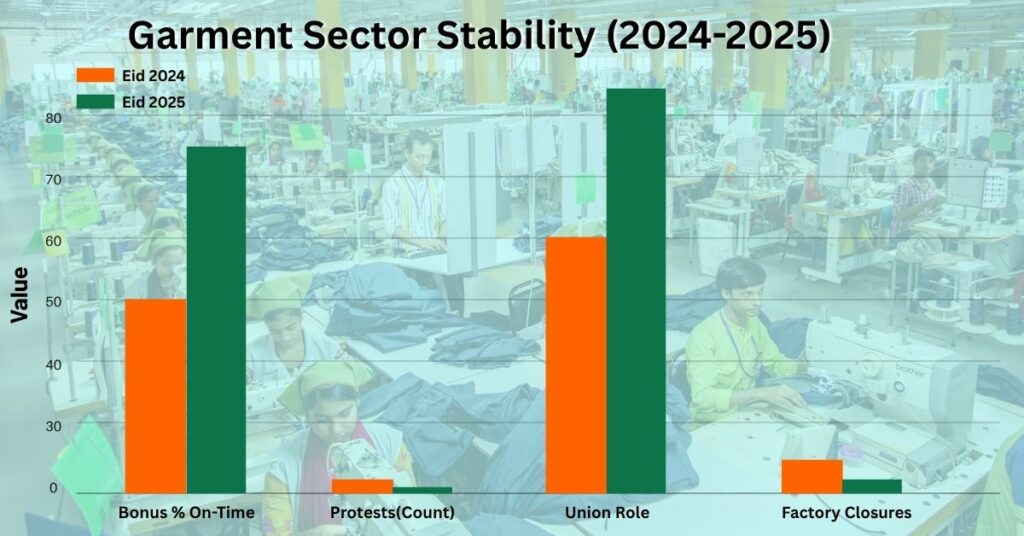
| Aspect | Eid 2024 | Eid 2025 | Change |
| Bonus Payment | <50% on time, partial or delayed | 76% on time; better clarity | ↑ Compliance with labor law |
| Protests | Gazipur, Mirpur, Ashulia blockades | Isolated protests; most resolved peacefully | ↓ Tension & disruptions |
| Union Role | Active, but reactive | Engaged early with factory owners | ↑ Dialogue & prevention |
| Factory Shutdowns | Sudden closures (e.g., Danys Knitwear) | Fewer closures, wage assurance via hotline | ↑ Worker protection |
5. Waste Management (Eid-ul-Adha)
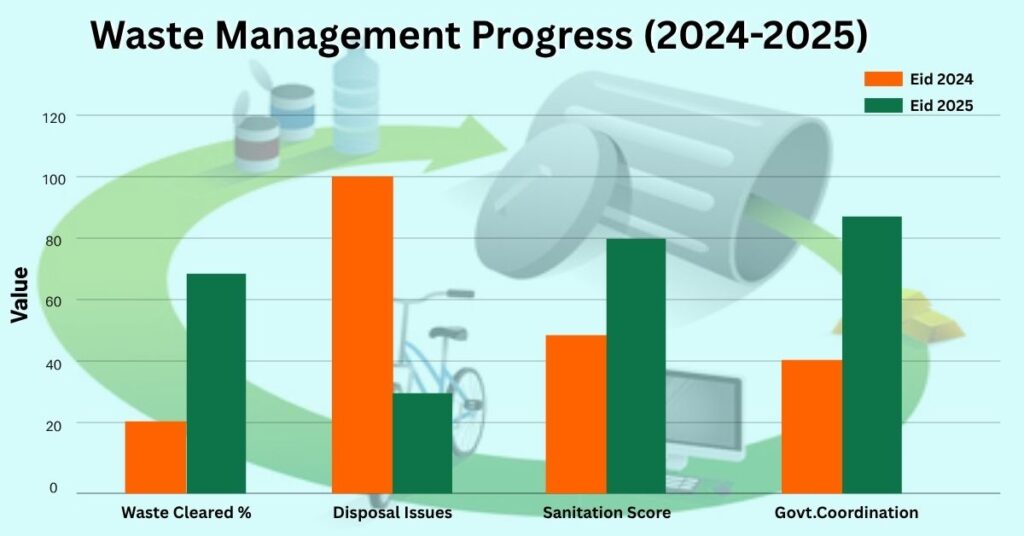
| Aspect | Eid 2024 | Eid 2025 | Change |
| Waste Cleared (24 hrs) | ~20% | ~65% | ↑ Faster cleanup |
| Disposal Issues | Waste in rivers, streets, poor drainage | Segregated bins, river protection zones | ↓ Environmental damage |
| Public Sanitation | Complaints about smell, mosquitoes | Less odor; better community awareness | ↑ Hygiene |
| Govt-Civic Coordination | Weak, late response | Pre-planned drives with volunteers, NGOs | ↑ Collaborative action |
5. Conclusion
Eid 2024 was symptomatic of the economic mismanagement, infrastructural decay, and systemic corruption that plagued the final years of Sheikh Hasina’s rule. Despite her long tenure, key economic vulnerabilities remained unaddressed. In contrast, Eid 2025 marked a new era of hopeful transformation under Dr. Muhammad Yunus’s ethical influence. His approach—rooted in transparency, social business, and decentralized cooperation—began to rebuild public trust and empowered previously neglected populations. So, the condition of Eid Price Trends and Economic Behavior will normal and better upcoming days.
References
Share via:

